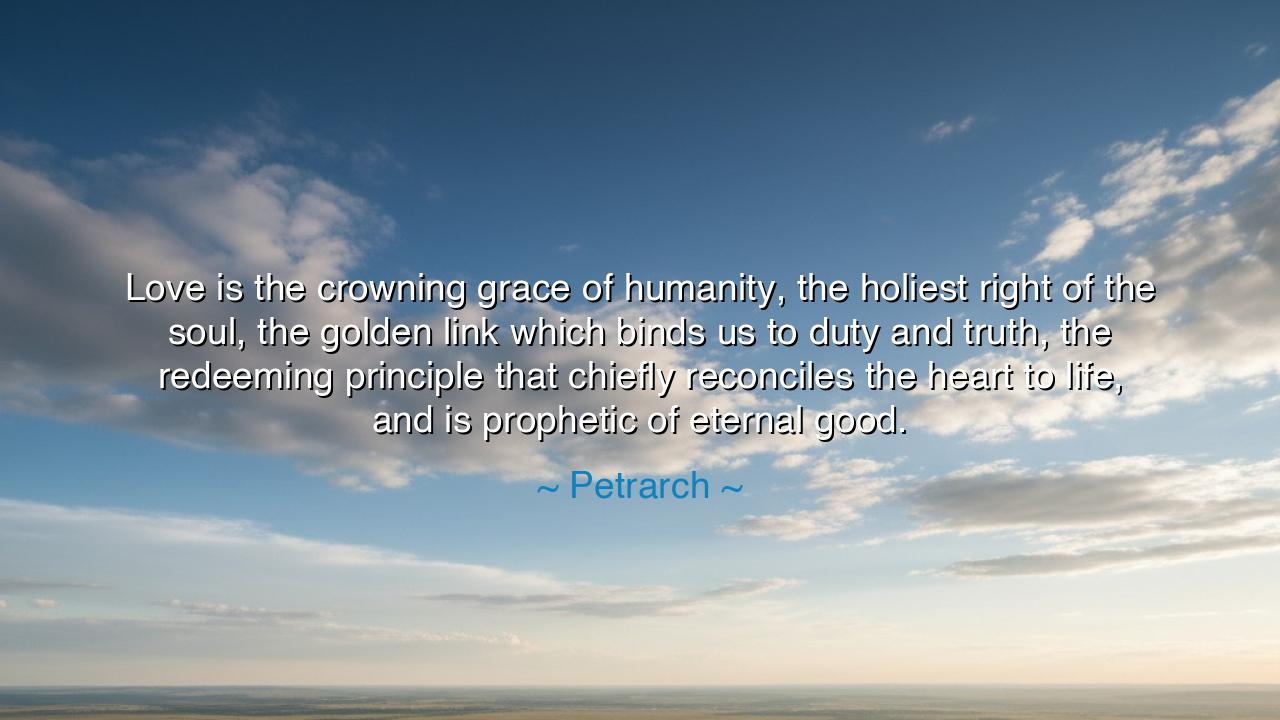
Love is the crowning grace of humanity, the holiest right of the
Love is the crowning grace of humanity, the holiest right of the soul, the golden link which binds us to duty and truth, the redeeming principle that chiefly reconciles the heart to life, and is prophetic of eternal good.






"Love is the crowning grace of humanity, the holiest right of the soul, the golden link which binds us to duty and truth, the redeeming principle that chiefly reconciles the heart to life, and is prophetic of eternal good." – Petrarch
In the luminous centuries of the Renaissance, when faith and intellect mingled like dawn and shadow, Francesco Petrarch — the father of humanism and the poet of the soul — wrote these immortal words. To him, love was not a passing sentiment nor a fleeting pleasure, but the highest expression of the human spirit — the crowning grace of humanity. It was the force that lifted humankind from mere existence into meaning, from instinct into virtue. Love, for Petrarch, was the divine spark within the mortal frame — the gift that reveals our nobility and calls us toward the eternal.
When he says that love is the crowning grace of humanity, he names it as the summit of all virtues, the adornment of our mortal journey. Wisdom, courage, justice — these may steady the human race, but love sanctifies it. It crowns the soul with purpose and beauty, for without love, all other virtues are hollow. A wise man without love is cold; a brave man without love is cruel; a just man without love is a judge without mercy. Love is what completes us — it is the divine seal upon the human heart.
To call it the holiest right of the soul is to remind us that love is not a privilege granted by the world, but an inborn sacred duty. Every soul, no matter how humble or broken, has the right to love and be loved. It is through this exchange that the soul fulfills its destiny — to mirror the goodness of its Creator. In loving another, we practice divinity; we rise beyond the narrow self and touch something immortal. Thus, love is not weakness, but the truest strength of the human spirit.
Petrarch continues: love is the golden link which binds us to duty and truth. In this, he speaks to love’s role as the bridge between emotion and action. True love does not free us from responsibility — it deepens it. When we love — our family, our nation, our fellow beings — we are called to act with integrity, to serve, to uphold what is right. Love anchors morality; it transforms duty from burden into devotion. It is the golden link that ties the heart’s passion to the soul’s purpose, making righteousness not a command, but a joy.
History offers shining proof of this truth. Think of Florence Nightingale, who left comfort and privilege to serve the suffering soldiers of war. It was not ambition that drove her, but love — a love for humanity so deep that it overcame fear, pain, and fatigue. Her compassion bound her to both duty and truth, transforming her service into something divine. Like Petrarch’s vision, her love was not romantic, but redemptive — the kind of love that heals and uplifts the entire world.
When Petrarch calls love the redeeming principle that reconciles the heart to life, he acknowledges that to live is often to suffer. The world can be harsh, filled with loss and imperfection. Yet, love redeems it all. Through love, even sorrow gains meaning, even hardship reveals beauty. A heart that loves finds peace not in perfection, but in compassion. Love softens bitterness, turns grief into gratitude, and gives us the courage to endure. It reconciles the heart to the impermanence of life, whispering that every fleeting joy and every silent tear belong to a greater whole — to the eternal rhythm of goodness itself.
And finally, he proclaims that love is prophetic of eternal good. For Petrarch, love was not merely a mortal flame, but a reflection of the divine light that awaits us beyond the veil of time. To love purely and selflessly is to touch eternity, to sense the perfection that lies beyond human frailty. Every act of love, no matter how small, is a prophecy — a sign that within us burns something infinite.
So, O children of the living soul, remember this: love is not a mere adornment of life — it is its foundation, its crown, and its destiny. Let love guide your duty, temper your truth, and redeem your suffering. Love not only those who are easy to love, but also those who are difficult, for in doing so, you cleanse the world and your own spirit. For as Petrarch teaches, love is the holiest right of the soul, the bridge between the human and the divine — the eternal song that calls us home.






AAdministratorAdministrator
Welcome, honored guests. Please leave a comment, we will respond soon